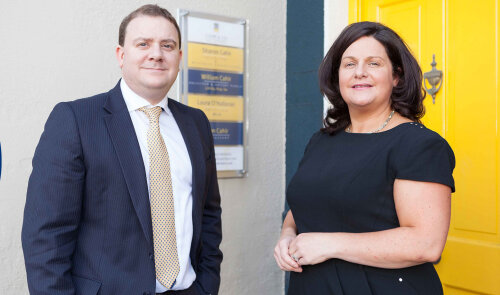Best Family Lawyers in Ennis
Share your needs with us, get contacted by law firms.
Free. Takes 2 min.
Free Guide to Hiring a Family Lawyer
List of the best lawyers in Ennis, Ireland
About Family Law in Ennis, Ireland
Family law in Ennis follows the national body of Irish family law but is applied through the local courts and services that serve County Clare. Common family law matters include divorce, judicial separation, child custody and guardianship, access (visitation), child maintenance, spousal maintenance, domestic violence protection measures, and issues arising from cohabitation or civil partnership breakdowns. Your local solicitors, the courts in the region and a range of statutory and community supports in Ennis and County Clare can help guide you through procedures and practical supports.
Why You May Need a Lawyer
Family matters often involve personal, financial and emotional complexity. A lawyer can help you understand legal entitlements and obligations, protect your rights, and represent you in negotiations or court. Common situations where people seek a family law solicitor include:
- Divorce or judicial separation - to manage the legal end of a marriage and any associated financial and custodial matters.
- Child custody, guardianship and access disputes - to protect the best interests of the child and secure workable parenting arrangements.
- Child maintenance and spousal maintenance disputes - to establish, vary or enforce maintenance obligations.
- Domestic abuse or harassment - to obtain protective orders and advise on safety planning.
- Property and financial settlement after relationship breakdown - to determine division of assets, debts and pensions.
- Cohabitation disputes - where couples who lived together need clarity on property or support rights.
- Adoption, assisted reproduction and guardianship issues - to handle complex consent and legal formalities.
- Prenuptial matters and pre-relationship planning - to prepare agreements and explain their legal status.
Local Laws Overview
Family law in Ennis is governed by Irish statutes and case law. Key legal points to bear in mind include:
- Divorce and separation - Divorce has been part of Irish law since the 1990s. To obtain a decree of divorce or judicial separation, the courts consider criteria such as separation period, proper arrangements for children, and whether the marriage can be maintained. The Circuit Court and High Court handle divorce and many complex family law matters; child-specific matters may also be handled by the District Court.
- Child welfare and guardianship - The welfare of the child is the primary consideration in all decisions affecting children. Guardianship confers rights and responsibilities for decisions about a child; custody and access determine where a child lives and contact with the non-resident parent.
- Child maintenance - Parents have a continuing duty to financially support their children. Maintenance can be agreed between parents, set by a court, or administered through the Maintenance Service.
- Domestic violence and protection orders - Courts can make safety orders, barring orders and other protections where there is harassment, threats or violence. Emergency measures can be sought quickly where safety is at risk.
- Cohabitation and property - Couples who cohabit do not have the same automatic property or maintenance rights as married couples. The court may consider contributions and other factors, but outcomes differ from divorce law.
- Alternative dispute resolution - Mediation and collaborative law are encouraged where appropriate to reach agreements about children and finances without full court hearings.
Local practice - Ennis residents use the courts and legal services operating in County Clare and the wider Munster region. Procedural steps are set nationally, but local solicitors and court listings will guide how to bring applications, hearings and interim measures locally.
Frequently Asked Questions
How do I start a divorce or judicial separation in Ireland?
To start a divorce or judicial separation you normally instruct a solicitor to prepare and issue court proceedings. Courts look for proof that the spouses have lived apart for the required period, that proper provision has been made for any children, and that there is no reasonable prospect of reconciliation. Your solicitor will explain required documents, timelines and options for interim orders such as maintenance or occupancy of the family home.
What is the difference between custody, guardianship and access?
Guardianship concerns the legal right to make major decisions about a child - for example education, medical treatment and religious upbringing. Custody generally refers to where the child lives and who has day-to-day care. Access, or visitation, is the right of a non-resident parent or family member to spend time with the child. The childs welfare is the court's top priority when making these decisions.
Can I get legal aid for family law matters in Ennis?
Legal aid can be available through the Legal Aid Board for qualifying persons and qualifying cases. Eligibility depends on financial means and the type of family law issue. Some matters, like certain domestic violence applications, may have easier access to legal supports. Your first step is to contact the Legal Aid Board to check eligibility and application procedures.
What emergency options exist if I or my children are at risk?
If you or your children are at immediate risk contact the Gardaí (police) and seek medical attention as needed. For urgent legal protections, you can apply for safety orders, barring orders or temporary custody arrangements through the courts. Local domestic violence services and crisis centres can provide shelter, safety planning and support in Ennis and County Clare.
How is property divided on separation or divorce?
There is no automatic equal split. Courts consider all relevant factors when dividing family assets - contributions by each party, the needs of any children, the duration of the marriage or partnership, and the financial resources of each spouse. Pensions and inheritances may be treated differently depending on circumstances. A solicitor can help you obtain valuations and prepare proposals or contested applications.
Are prenuptial agreements legally binding in Ireland?
Prenuptial agreements - sometimes called prenups - are not automatically legally binding in Ireland. However courts may give effect to a nuptial agreement if it is fair, entered into with full disclosure, and its application would be just and reasonable in the circumstances. Proper legal advice and clear evidence of independent legal counsel and disclosure improve the agreement's weight in court.
What is mediation and should I consider it?
Mediation is a voluntary process where a trained, neutral mediator helps separating parties negotiate agreements on children, finances and property. It is often faster, less costly and less adversarial than court. Mediation is suitable where both parties are able to communicate and there is no ongoing domestic violence or coercion. Your solicitor can advise when mediation is appropriate and when court action may be necessary.
How is child maintenance calculated?
Child maintenance can be agreed between parents or ordered by the courts. The Maintenance Service provides a statutory framework for assessing and enforcing maintenance, but courts can set amounts based on the child's needs and the paying parent's means. Factors include each parents income, the number of children, and reasonable expenses for the childs upbringing.
Can grandparents apply for access to see their grandchildren?
Yes, grandparents can apply to the court for access or contact orders where appropriate. The courts consider the childs welfare and the nature of the relationship when deciding whether to grant access to grandparents or other relatives. Legal advice can help grandparents understand the likely prospects of success and the best way to apply.
What if one parent moves abroad with the child?
Cross-border relocation raises complex jurisdictional and custody issues. A parent planning to move should seek legal advice and, in many cases, obtain the consent of the other parent or a court order. If a parent takes a child abroad without proper consent, international agreements and court processes may be used to return the child or resolve custody. Prompt legal action is important in such cases.
Additional Resources
For reliable help and further information consider these resources and bodies:
- Citizens Information - for clear guidance on rights, entitlements and procedural steps for family law issues.
- Legal Aid Board - for information about eligibility for state-funded legal representation.
- Courts Service of Ireland - for court procedures, forms and local court listings relevant to family law cases.
- Tusla - Child and Family Agency - for services and guidance related to child welfare and protection.
- Local family resource centres and community supports in County Clare - for practical and community-based assistance.
- Law Society of Ireland - for finding accredited solicitors and understanding professional standards.
- FLAC (Free Legal Advice Centres) and local legal clinics - for free initial advice sessions when available.
- Domestic violence support organisations and local crisis services - for safety planning, refuge and counselling if you are affected by abuse.
Next Steps
If you need legal help with a family law matter in Ennis, consider these practical next steps:
- Gather key documents - marriage certificate, birth certificates for children, bank statements, payslips, property deeds, mortgage and pension details, and any relevant correspondence.
- Seek an initial consultation - contact a local family law solicitor to discuss your situation, likely options and expected costs. Ask for a clear fee estimate and whether fixed-fee or staged services are available.
- Explore immediate protections - if safety is a concern, contact the Gardaí and local domestic violence services. Ask a solicitor about emergency court orders.
- Consider alternatives - mediation or negotiation may resolve matters faster and with less stress than court. Ask about mediation services and whether they could apply to your case.
- Check legal aid eligibility - if funds are limited, contact the Legal Aid Board early to see whether you qualify for assistance.
- Keep records - maintain a dated file of key events, communications and any incidents affecting safety, finances or child welfare. This can be important evidence if court proceedings become necessary.
- Get support - family law matters are stressful. Use community supports, counselling and local supports in Ennis to help manage practical and emotional needs while you address the legal issues.
Every family situation is different. A solicitor experienced in Irish family law and familiar with local practice in County Clare can give tailored advice about your rights, likely outcomes and the best route forward.
Lawzana helps you find the best lawyers and law firms in Ennis through a curated and pre-screened list of qualified legal professionals. Our platform offers rankings and detailed profiles of attorneys and law firms, allowing you to compare based on practice areas, including Family, experience, and client feedback.
Each profile includes a description of the firm's areas of practice, client reviews, team members and partners, year of establishment, spoken languages, office locations, contact information, social media presence, and any published articles or resources. Most firms on our platform speak English and are experienced in both local and international legal matters.
Get a quote from top-rated law firms in Ennis, Ireland — quickly, securely, and without unnecessary hassle.
Disclaimer:
The information provided on this page is for general informational purposes only and does not constitute legal advice. While we strive to ensure the accuracy and relevance of the content, legal information may change over time, and interpretations of the law can vary. You should always consult with a qualified legal professional for advice specific to your situation.
We disclaim all liability for actions taken or not taken based on the content of this page. If you believe any information is incorrect or outdated, please contact us, and we will review and update it where appropriate.
Browse family law firms by service in Ennis, Ireland
Ennis, Ireland Attorneys in related practice areas.










